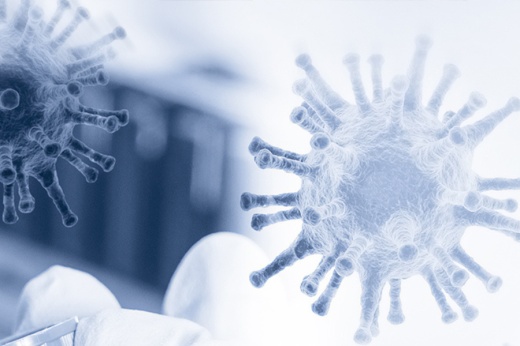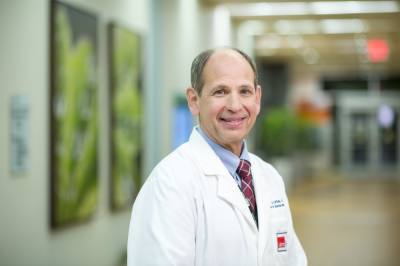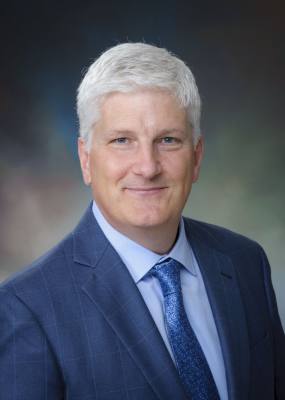A new research study conducted by UTMB’s Dr. Randall Urban and Dr. Richard “Rick” Pyles has unearthed new discoveries about the effects of Long COVID-19 and related treatments.
Dr. Urban, a professor, endocrinologist and vice president and chief research officer at UTMB Health, and Dr. Pyles, a professor in the Department of Pediatrics and the Department of Microbiology and Immunology at UTMB Health, began to notice that months after being diagnosed with COVID-19, patients were still experiencing long-term effects. Even patients who only experienced a mild case of the virus were seeing side effects such as difficulties with blood pressure and anxiety.
While also studying patients who have suffered a traumatic brain injury, the doctors began to notice some of the lingering effects were similar to patients who were dealing with Long COVID.
“As our research group began to read about the long-hauler symptoms, there was a subset of those patients who had symptoms which were very much like our brain injury associated fatigue and altered cognition (BIAFAC) patients,” Dr. Urban said.
The main focus of the study centered on one main similarity both patients experienced. Typically, BIAFAC patients see an abnormally low secretion of growth hormone, which can cause brain fog and increased levels of fatigue. When subjected to growth hormone treatment, most patients saw decreased levels of these symptoms.
Since patients with Long COVID and BIAFAC had similar symptoms, Dr. Urban and Dr. Pyles are working to see if the same growth hormone treatment would work on Long COVID patients.
“As we’re testing these patients, we’re finding that they, just like our brain injury patients, have abnormally low growth hormone secretion,” Dr. Urban said. "We are currently completing a study with patients with Long COVID where we are treating them with growth hormone to determine if they will improve like our BIAFAC patients.”
This discovery of the similar patterns in low growth hormone secretion among these two patient populations led the doctors to believe they were dealing with something larger than just brain injuries.
Through the research, the doctors discovered a resistance to gaining weight, meaning there was something different about the way these patients were metabolizing food.
“The group posed a theory suggesting that the bacteria that live in your intestines may have changed as a result of the traumatic brain injury or as a consequence of COVID,” Dr. Pyles said. “When those changes took root, you would process your food differently and that would lead to changes in the loading of your blood and a different availability of building blocks for things like growth hormone production. As a consequence, if you modify that pipeline, you would end up with a limited ability to have normal functionality in your nervous system, leading to brain fog and fatigue.”
Based on their studies, the doctors were able to confirm these side effects were based on bacteria living in the gut. This realization has led to the belief that there might be a broader group of patients outside of those affected by Long COVID or traumatic brain injury who may be suffering from similar side effects.
The duo hope to receive answers from a recently developed survey that runs on your smartphone that the group created that could help determine if there are more patients who can shed light on their long-term effects.
“Studies from other researchers say up to 80% of people have some form of Long COVID for a few weeks after they clear the infection,” Dr. Pyles said. “That's what we're trying to get a handle on with this new survey that we think is going to be very powerful to identify not only the long haulers, but some of the other etiologies from the other end of the pipe.”
To learn more about the study and to stay up-to-date on future research, read the online synopsis.
The above story was produced by Community Impact's Senior Multi Platform Journalist Sierra Rozen with information solely provided by the local business as part of its "sponsored content" purchase through our advertising team.
Select your community
Support Us
News
- Austin Metro
-
Houston Metro
- Houston Metro Home
- Bay Area
- Bellaire | Meyerland | West University
- Conroe | Montgomery
- Cy-Fair | Jersey Village
- Cypress
- Heights | River Oaks | Montrose
- Katy | Fulshear
- Lake Houston | Humble | Kingwood
- New Caney | Porter
- Pearland | Friendswood | Manvel
- Spring | Klein
- Sugar Land | Missouri City
- The Woodlands
- Tomball | Magnolia
- Dallas | Fort Worth Metro
- San Antonio Metro








